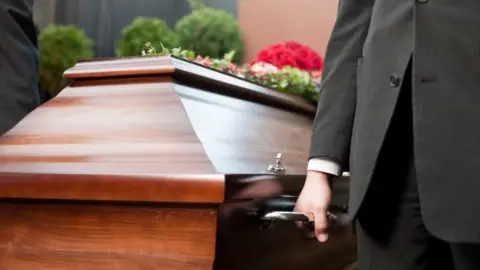Coronavirus: Funeral services 'could have been overwhelmed'
 Getty Images
Getty ImagesThe number of cremations almost trebled in part of Wales during the peak of the coronavirus pandemic.
Cardiff council expanded its capacity to 30 cremations per day for three weeks in May - three times the average - and reached 87% of that capacity.
Rhondda Cynon Taff council leader Andrew Morgan said cremation and burial services could have been "overwhelmed" in the worst-case scenario.
However, most councils said contingency measures were ultimately not used.
Cardiff council said bereavement services were "under pressure" but "never close to being overwhelmed".
The council redeployed 32 staff to increase capacity for cremations, initially to 20 per day, before increasing the number to 30 per day for three weeks in May.
During those three weeks, the authority said the service was, at most, 87% full, which equates to 26 cremations in one day.
Typically, the council would average 50 cremations per week, an average of 10 per day, although this number can vary day to day.

Meanwhile, Mr Morgan said Rhondda Cynon Taff council came close to a "real crisis" and that the initial modelling of the situation would have seen cremation, burial and mortuary services "significantly overwhelmed".
The Local Democracy Reporting Service reported that, during a meeting of the council's overview and scrutiny committee, Mr Morgan said: "I really don't think that probably a lot of members and certainly members of the public know exactly how close things got to being a real crisis.
"The potential under a worst-case scenario would have seen our morgue and burial services outstripped by several hundred times."
What about services in the rest of Wales?
Councils across Wales put in extra measures to ensure bereavement services did not become overwhelmed during the pandemic.
BBC Wales contacted all 22 local authorities in Wales to ask about the strain on cremation, burial and mortuary services since March.
Among those to respond was Pembrokeshire council, which said it doubled its number of weekly cremation services from 50 to 100, and had plans to extend this to more than 200 per week if needed.
The council also dug extra graves and increased its capacity to store bodies, which was not needed.
In Powys there is no crematorium, but burial services were not affected. However, the council did "plan for a worst-case scenario" and developed a temporary mortuary facility in Llanelwedd, which was not used.
In Wrexham, plans were put in place to extend operating hours to carry out cremations at weekends, but these were not needed, while Flintshire council also had plans to double the size of its workforce in bereavement services.
Conwy and Gwynedd councils reported all burials and cremations within the counties were able to take place within existing capacity.
In Newport, Blaenau Gwent, Torfaen, Caerphilly and Monmouthshire, plans were put in place to speed up the death registration process, increase the operating hours of crematoriums and adding additional mortuary space.
